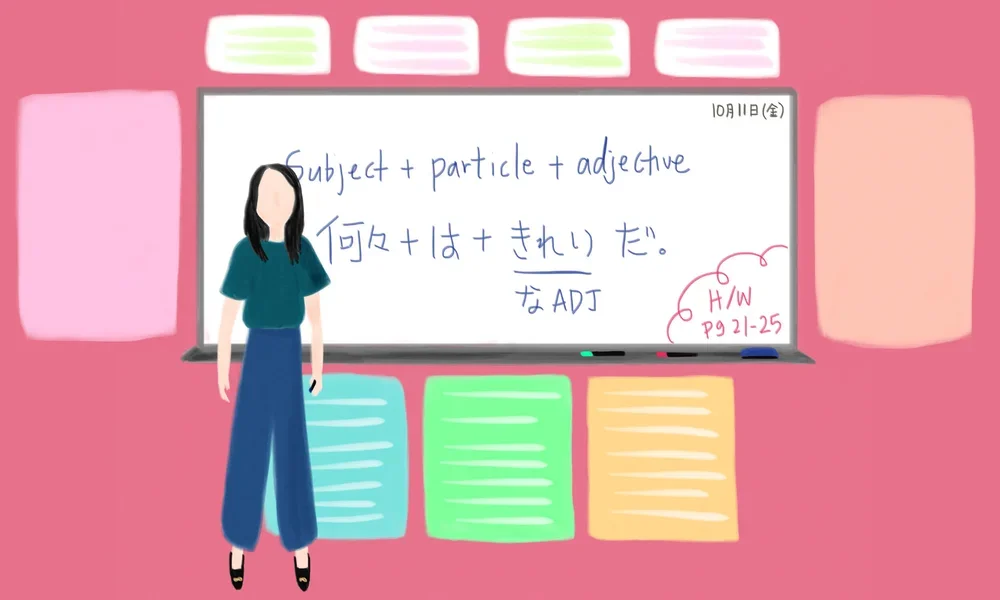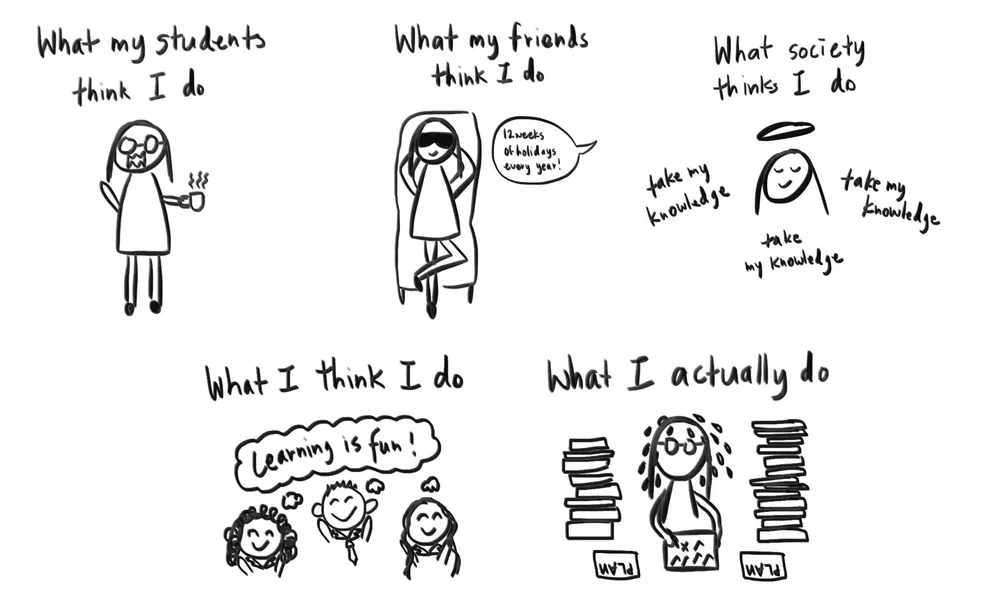High School Teacher
Amelia is a Languages Other Than English (LOTE), high school teacher who believes that learning about culture through language is a gateway to opening new perspectives, self-awareness and the opportunity to communicate with a whole new world.
“Teaching is an act because when I’m in front of a class, I don’t talk to other people the way I talk to my students. I just have to put on my teacher voice and morph into my teaching persona.”
What a High School Teacher (actually) does
Besides teaching content, assessing, giving feedback and managing behaviour, students never see us plan—it’s very behind the scenes. I plan when I’m not teaching, I plan during the school holidays, there’s so much planning and preparation involved and I find that especially for early career teachers, we’re always second guessing ourselves on delivering particular parts of a lesson differently, putting enough effort into a worksheet, presentation or activity or doubting whether it could have been better a different way. Making resources for lessons takes time and I think the one source of support that early career teachers need is time to plan and make resources. That’s one thing I didn’t expect to be time consuming.
I spend a lot of time discussing student wellbeing with other teachers which I didn’t think about when I was a student. We’ll be informed about topics like the death of a family member, divorce or personal issues which makes us become aware of changes in a student’s behaviour and this helps us communicate with and delegate work more tactfully to them.
Maintaining a balance
I try to create lessons that are the right level of challenge for students, ensure content is relevant, useful and that it sets them up for success. If they constantly find work too difficult and never see positive results or feel a sense of achievement, then they’re going to start to disengage, so I try to set work that is achievable and makes them feel confident. If students feel like they are improving academically, it’s a big boost to their self-esteem and confidence. It sets them up to achieve more in the future and prepare for the skills they need to be a member of society.
More than just teaching content
I want to provide students with a safe space at school so they feel comfortable and can be themselves. If there’s something going on and I spot it and am able to assist in getting them the help they need even if it’s not academic-related, it’s always nice to know that they feel safe and supported at school.
Seeing students actually learning and being able to be a part of that is rewarding. I enjoy really getting to know the students and if I can develop positive rapport with them to influence them to enjoy learning, become motivated to do their best and improve themselves, that’s always fulfilling. I see students grow as human beings, go through difficulties and overcome them.
Helping students with navigating
When students get to the stage where they’re deciding on what to do for tertiary studies or whether they want to pursue tertiary studies, if I can support them, give them the resources to help make that decision easier or guide them in the right direction then, I feel like that’s a large part of their life especially because sometimes they see their teachers more than their parents and I feel like teachers can be a big source of guidance and influence on them at that stage in their life. Students do rely on their teachers a lot as adult figures in their lives. I get to be a part of their decision making process for their future direction and see them becoming young adults. It is a lot of work but when I feel like I’ve pulled off a fruitful lesson or see a positive change in a student, it’s always worth it.
“My teaching persona isn’t something outside of my personality but a different part of my personality that’s completely untouched in other parts of my life.”
Transitioning from student to teacher
My first practicum felt a bit like culture shock to me in terms of the age gap. It was at a private boys school and the oldest students I taught were in a Year 10 class aged 15 to 16. At the time I was 21 so I felt quite intimidated by teaching those just a few years younger than me.
Teaching is an act because when I’m in front of a class, I don’t talk to other people the way I talk to my students. I just have to put on my teacher voice and morph into my teaching persona. I used to write down exactly what I wanted to say and run them through my head for particular activities like a script because I was so nervous. I got used to it after a while but sometimes still feel uncomfortable listening to the things coming out of my mouth. My teaching persona isn’t something outside of my personality but a different part of my personality that’s completely untouched in other parts of my life.
Choosing what to study
I studied a Bachelor of Secondary Education and Arts, majoring in Japanese and minoring in Chinese.
I started off with just a Bachelor of Arts because I had no direction but knew I wanted to continue learning Japanese because I felt I hadn’t learned enough from high school. I knew I could do that with an arts degree and there were other units like history which I was interested in. I did some junior education units in my first year and enjoyed them so transferred to secondary education. There was nothing else that really interested me at the time that I thought I could be good at. I would’ve wanted to become a vet but I don’t like blood or cutting things up.
The more I was learning Japanese, the more challenging it was and made me feel a sense of achievement when I was able to speak to someone in a different language. Being able to talk to so many new people and seeing past the important but superficial aspects of culture like yummy food and cool movies, to learning about the complexities of social conditions or people’s behavioural patterns and choices—it’s a whole new world. I think learning about other cultures allows us to reflect on our own and makes us realise how much we’re shaped by it. Seeing beyond what I classify as normal feels like training my brain to think in different ways.
Having purpose
When I first went into teaching I didn’t know what my purpose was. The more I learned about inequality within the education system, the more I was certain about teaching for the public sector and giving students the best possible learning experience. I have this overarching belief that education is essential and everyone deserves the best no matter where they come from. A major defining factor of our socio-economic condition is education so I think that goes to show the disparities of funding within the schooling system. The more I’ve been exposed to that, the more I’ve been motivated to do my best in the public sector.
I want to create change doing what I can on a smaller scale. I don’t think I can drastically change the education system, it’s about the day-to-day decisions and changes that I don’t notice in the short-term, but can see after a long period of time through student development.
I feel like high school is such an important time in everyone’s life where we learn about ourselves and start to grow into a different people. I want to be a part of that and make a positive change in students’ lives.
Always learning
I think the most important thing is that you care and you’re ready to put in the work for whatever job you choose to do. There’s no easy way around or getting past a difficult point in your studies or career, you just have to keep working at it. I have lots of bad days but I look at the bigger picture and foster a genuine concern for the students. As long as there’s a reason, motivation, purpose and care for something, you’’ll be fine. Having a purpose behind your job is the most important thing.

